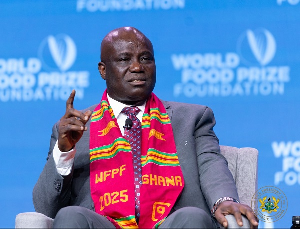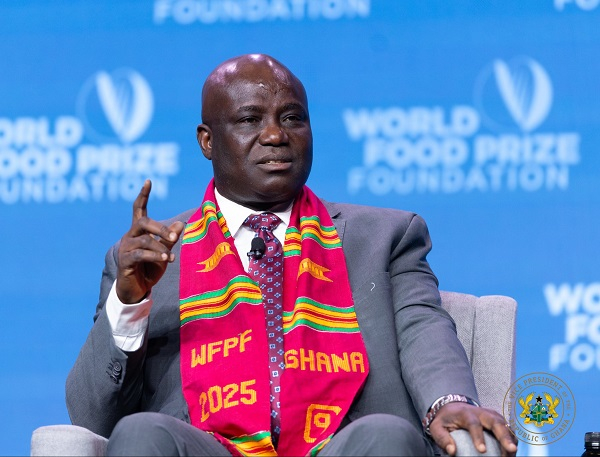 Eric Opoku is the Minister of Food and Agriculture
Eric Opoku is the Minister of Food and Agriculture
Ghana’s heavy dependence on imported food reached a worrying point before the National Democratic Congress (NDC) administration took office on January 7, 2025, with the nation spending close to $3 billion annually on basic items such as rice, poultry, vegetable oils, sugar, and processed foods.
These products, many of which could be produced locally, placed intense pressure on the country’s foreign exchange reserves and left Ghana vulnerable to global price fluctuations.
The Minister for Food and Agriculture, speaking at a press conference in Accra on November 24, 2025, cautioned that between 2022 and early 2025, food prices soared across the country.
In several major urban markets, the cost of staple goods more than doubled. The situation peaked in January 2023, when food inflation hit a historic 61%, marking the highest level ever recorded. Though inflation eased slightly afterward, it remained uncomfortably high, severely affecting household purchasing power and increasing the overall cost of living.
“By the time the NDC government assumed office, food inflation stood at 28.3%, reflecting a fragile economic environment,” he said.
However, through targeted interventions and stronger policy direction, the government has successfully stabilized price pressures. As of October 2025, food inflation has dropped to 9.5%, offering significant relief to families and businesses.
According to the Minister of Food and Agriculture, this progress was achieved through foundational reforms implemented immediately after the administration took office. These reforms aim to boost Ghana’s long-term agricultural productivity, ensure sustainability, reduce import dependence, and build a resilient food system.
One of the most urgent priorities has been seed production and localization. For years, “Ghana faced delayed deliveries of imported seeds, many of which arrived well after planting seasons, affecting yields and undermining food security,” he added.
To address this, the government has made local seed production a national strategy, stressing that seed sovereignty is essential for food sovereignty.
The Ministry has also moved to deepen collaboration with Ghana’s research institutions in areas of seed development, testing, and certification. In a major policy shift, the Ministry of Food and Agriculture has announced that starting in 2026, all seeds supplied to Ghanaian farmers will be sourced locally—a move expected to strengthen domestic production capacity and support long-term agricultural transformation.
